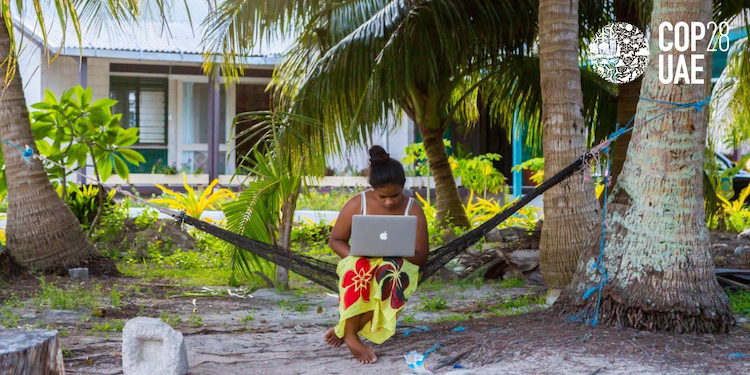By Ria Shibata*
Toda Peace Institute issued this article, and it is being republished with their permission.
WELLINGTON, New Zealand | 4 December 2023 (IDN) — As the 28th Conference of the Parties (COP28) […], the global community braces for tough negotiations over climate finance, emission reductions, adaptation strategies and funding for climate-induced loss and damage. And the stakes have never been higher for the population of the Pacific Island nations.
These nations, although contributing insignificantly to global carbon emissions, find themselves on the front lines of climate change, facing existential threats that transcend economic calculations. At COP28, particularly for the Pacific Islanders, the issue of non-economic loss and damage must also be addressed together with compensation for tangible damages and losses. It is within this context that the voices of the Pacific youth at COP28 become absolutely indispensable.
Loss and damage in the context of climate change are often relegated to economic assessments—quantifiable impacts like damaged infrastructure, lost revenue, or the costs of adaptation and mitigation. However, for Pacific Islanders, the climate crisis has precipitated a cascade of non-economic losses that are impossible to value in terms of dollars yet have the most profound and devastating consequences on their health and well-being.
Non-economic loss and damage encompass a range of intangible impacts, including the loss of homeland, cultural identity, traditional indigenous knowledge, biodiversity, and ancestral burial sites. These losses cut to the core of what it means to be a Pacific Islander, for whom land is not just a place to live but a bedrock of heritage and a source of spiritual connection.
Pacific youth bring to the table an understanding of the consequences of losing their ties to their ancestral lands, experiencing the erosion of their dignity as they deal with loss of cultural identities associated with forced relocation to unfamiliar landscapes. At COP28, delegates must acknowledge that these intangible assets are as vital as infrastructure and economic resources and the role of youth delegates must go beyond storytelling and symbolic participation.
A glaring oversight in current climate policies
The plight of Pacific Islanders illustrates a glaring oversight in current climate policies, which largely ignore these crucial aspects of holistic human well-being. As sea levels rise and extreme weather events become more frequent and intense, some Pacific communities are already being forced to relocate, setting a precedent for climate-induced displacement. This is not just a move from one place to another; it is an uprooting of life itself, with deep psychological, social, and cultural ramifications.
It is time for the global community to earnestly integrate young people’s insights and experiences into the decision-making process. It is vital that youth involvement is not mere tokenism. It is necessary to establish platforms that not only hear but heed the suggestions of Pacific youth, ensuring that they have a seat at a table where strategies and commitments are formulated. Their involvement should shape the negotiations and policies that will define the international climate action agenda.
Furthermore, we need to discuss ways in which capacity-building of Pacific youth can be supported. The presence and active participation of Pacific youth at COP28 should not be a tokenistic courtesy—but a critical necessity. They embody the frontline of climate change losses and damages for the Pacific communities. It is only by listening to their voices, amplifying their messages, and acting on their recommendations that we can hope to forge a climate resilient future for the Pacific.
As Pacific Islanders lose their territories, the world risks losing unique cultures that have lived in harmony with their natural environments for millennia. The indigenous knowledge and practices of these communities in sustainable living are invaluable in the global quest to adapt to and mitigate the effects of climate change. By not acting decisively to protect these non-economic assets, the global community stands to lose a rich knowledge of diversity and relationality that once lost, will be difficult to recover or replace.
COP28 needs to serve as a pivotal moment where the conversation is broadened, and frameworks are developed to include non-economic losses in the formal loss and damage mechanism. The Warsaw International Mechanism for Loss and Damage, established during COP19, needs to be re-examined to encompass the holistic impacts of climate change. Financial support is undoubtedly essential, but it needs to be coupled with genuine efforts to recognize and aim to preserve the intangible heritage of the affected communities and populations.
At COP28, the inadequacy of current metrics used in climate change loss and damage assessments needs to be addressed. Traditional economic indicators cannot capture the grief of a community that has lost its sacred sites or the loss felt by the younger generations witnessing the erosion of their spiritual roots. The international legal framework may need to adapt to recognize the rights of those displaced by climate change, including their rights to protect their cultural values, identity and way of life.
Related articles in the COP28 series:
COP, peace and the Pacific Islands (3-minute read)
PCC at COP28: Advocating for phasing out fossil fuels, funding for loss and damage, and peace (3-minute read)
A loss and damage fund in the Pacific? (3-minute read)
Between a rock and a hard place (3-minute read)
This is not climate justice: The Australia–Tuvalu Falepili Union (3-minute read)
A new Pacific Diplomacy for COP28 (3-minute read)
Building Peace Amidst Climate Challenges: Insights from Conciliation Resources (3-minute read)
*Ria Shibata is a Senior Research Fellow at the New Zealand Centre for Global Studies. Her research explores the nexus between climate change, loss of land and identity amongst youth in the Pacific diaspora communities in New Zealand, Australia and Fiji. [IDN-InDepthNews]
Image: maloff/shutterstock.com
Original link: https://toda.org/global-outlook/2023/cop28-and-the-unaccounted-loss-and-damage-for-pacific-youth.html
IDN is the flagship agency of the Non-profit International Press Syndicate.


